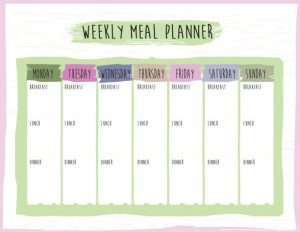How Do I Make a Food Timetable As a Student in Nigeria?
As a student, making a food timetable can go a long way for you.
A food timetable makes it easier to maintain a balanced diet and saves you the stress of not knowing what to cook or eat.
Most students don’t have a food timetable. They just eat whatever they feel like. But it shouldn’t be that way.
A food timetable can also help you keep track of your weekly or monthly expenditure on foodstuffs.
Today, I will be showing you how to make a simple food timetable as a student in Nigeria and stay on top of your diet.
How Do I Make a Food Timetable as a Student in Nigeria?

As a student in Nigeria, creating a food timetable can help you stay on track with healthy eating and ensure you’re getting the nutrients you need.
Here are some tips to help you create a food timetable that is both nutritious and budget-friendly.
1. Assess Your Daily Food Needs
Before you start planning your meals, it’s crucial to know how many calories your body needs per day to maintain a healthy weight.
There are many online calculators that can help you determine your daily caloric needs based on factors such as age, weight, height, and activity level.
But wait, what’s a calorie anyway? A calorie is a unit of measurement for energy.
Your body uses calories from the food you eat for all sorts of activities, from breathing and moving to think and digesting food.
So, it’s essential to make sure you’re getting the right amount of calories to fuel your body and mind.
2. Plan Your Meals for the Week
Now that you know how many calories you need, it’s time to plan your meals for the week.
But before you start drooling over your favorite Nigerian dishes, remember to incorporate a variety of food groups into your meals.
Aim to include carbohydrates, protein, vegetables, and fruits in every meal to ensure you’re getting all the essential nutrients your body needs.
Meal planning can seem overwhelming, but it’s not as complicated as it seems.
You don’t have to create gourmet dishes every day of the week.
Keep it simple and focus on easy-to-prepare meals that you enjoy.
For example, boiled or scrambled eggs, oatmeal, or smoothies for breakfast, sandwiches or wraps for lunch, and rice, beans, or vegetables with a side of grilled chicken or fish for dinner.
3. Create a Shopping List and Budget
Before you hit the grocery store, make a list of the items you need for your meals and snacks.
This will help you stay organized and prevent you from buying items you don’t need, which can save you money.
But wait, don’t forget to stick to your budget.
Eating healthy doesn’t have to break the bank, but it does require a little planning.
One way to save money on groceries is to shop for seasonal produce.
Seasonal produce tends to be more affordable and fresher than out-of-season produce.
Another way to save money is to buy in bulk.
You can purchase items such as rice, beans, or pasta in large quantities, which can save you money in the long run.
4. Prepare Your Meals
Meal prepping can be a lifesaver for busy Nigerian students.
It can save you time, and money, and help you avoid the temptation of eating unhealthy fast food or snacks.
Choose a day of the week when you have some free time and prepare your meals for the week.
Cook your rice, beans, and protein in advance, and store them in airtight containers in the fridge or freezer.
If you’re short on time during the week, try cooking in batches.
You can prepare a big pot of soup or stew and portion it out for the week.
Another time-saving technique is to use a slow cooker or instant pot.
These appliances can help you cook delicious meals without having to stand over the stove for hours.
5. Store and Preserve Your Food
Proper storage and preservation techniques can help you avoid food waste and save you money.
Always use airtight containers to store your food, and label them with the date and contents.
This will help you keep track of how long your food has been stored and prevent you from eating expired food.
You can also use the freezer to extend the shelf life of your meals.
Cook in bulk, and store the extra portions in the freezer for later use.
This is especially useful for soups, stews, and casseroles.
In conclusion, By applying these tips, you can make a perfect food timetable as a student in Nigeria.
Also Read: What Can I Cook As a Student in Nigeria?
Why Should I Have a Food Timetable As a Student in Nigeria?

Here’s why you need to create a food timetable as a student in Nigeria:
1. Say Goodbye to Mealtime Stress with a Food Timetable
Are you tired of having to decide what to eat every day?
Do you find yourself scrambling for food at odd hours because you didn’t plan ahead?
Creating a food timetable can help you say goodbye to mealtime stress.
By planning your meals in advance, you won’t have to worry about what to eat each day.
This can save you a lot of time and energy, especially if you have a busy schedule as a student.
2. A Food Timetable Can Help You Maintain a Healthy Diet
Eating a balanced and healthy diet is important for your overall health and well-being.
However, with a busy student schedule, it can be difficult to make sure you’re eating the right foods.
A food timetable can help you plan out your meals in advance to ensure that you’re getting a balanced and healthy diet.
This can help to prevent health problems such as obesity, heart disease, and diabetes.
3. Save Money by Planning Your Meals in Advance
As a student, money can be tight.
One way to save money on food is by planning your meals in advance.
With a food timetable, you can make a shopping list and buy groceries in bulk, which can save you money in the long run.
Also, by planning your meals in advance, you can avoid the temptation to eat out or order takeout, which can be expensive.
4. Increase Productivity with a Set Meal Schedule
Have you ever felt distracted or unfocused during class or study time because you were hungry?
Creating a food timetable can help you avoid this problem.
When you have a set meal schedule, you can avoid feeling hungry or distracted during classes or study time.
This can help you to stay focused and productive throughout the day.
5. Develop Good Time Management Skills with a Food Timetable
Creating a food timetable requires planning and organization skills, which can be beneficial in other aspects of your life as a student.
It can help you develop good time management skills, which can be useful for academic and personal life.
By planning your meals in advance, you can learn to manage your time effectively, which can help you be more productive and achieve your goals.
To summarize, creating a food timetable is an essential tool for students in Nigeria.
It can help you say goodbye to mealtime stress, maintain a healthy diet, save money, increase productivity, and develop good time management skills.
So why not give it a try and see how it can benefit you?
Factors to Take Into Account Before Making a Food Timetable as a Student In Nigeria

Here are some factors to take into account before making a food timetable as a student in Nigeria:
1. Your Dietary Restrictions and Preferences
Do you have any dietary restrictions or preferences that affect the food you can eat?
Are you a vegetarian or vegan, or do you have any food allergies or intolerances?
These factors are important to consider when creating a food timetable.
For example, if you’re a vegetarian, you’ll need to plan for meals that provide enough protein from plant-based sources, such as beans, nuts, and tofu.
If you have food allergies, you’ll need to be careful to avoid any foods that could cause a reaction.
2. Your Time Constraints
As a student, your schedule is likely to be busy and varied.
Consider how much time you have available for cooking and eating.
Will you have time to cook from scratch every day, or will you need to rely on pre-made or convenience foods at times?
One strategy is to batch cook and meal prep on the weekends so that you have healthy meals ready to go during the week.
3. Your Budget
Budget is another important factor to consider when making a food timetable.
How much money do you have to spend on food each week or month?
Consider how much ingredients and groceries cost in your area, and plan your meals accordingly.
Eating a healthy diet doesn’t have to be expensive, but it does require some planning and creativity.
4. Availability of Ingredients
Depending on where you live in Nigeria, certain ingredients may be more or less available.
It’s important to consider what ingredients you can easily find at your local market or grocery store.
For example, if you live in an area with a lot of seafood, you may want to plan for meals that incorporate fish or shellfish.
If fresh produce is hard to come by, you may need to plan for frozen or canned vegetables instead.
5. Your Cooking Skills and Equipment
Finally, consider your cooking skills and equipment.
Are you comfortable in the kitchen and able to prepare meals from scratch, or do you need to rely on pre-made or convenience foods?
Do you have access to a stove, oven, and other cooking equipment?
If you’re new to cooking, start with simple recipes and gradually build your skills.
If you have limited cooking equipment, focus on meals that can be prepared on a single burner or in a slow cooker.
To summarize, creating a food timetable as a student in Nigeria requires careful consideration of your dietary restrictions and preferences, time constraints, budget, availability of ingredients, and cooking skills and equipment.
By taking these factors into account, you can create a plan that works for your individual needs and helps you maintain a healthy and balanced diet.
With a little planning and creativity, you can enjoy delicious meals that support your health and well-being.
Also Read: List of Food Provisions for Boarding School in Nigeria
How Can I Stick to My Food Timetable as a Student in Nigeria?

To be honest with you, sticking to a food timetable as a student can often be difficult.
One thing is to make a food timetable and another thing is to stick to it.
However, as someone who has been there before, I have got some tips that can help you stick to your food timetable.
1. Be Realistic
It’s important to be realistic about your schedule and cooking abilities when creating your food timetable.
Don’t set yourself up for failure by planning to make complicated meals that require a lot of time and effort on days when you have a full schedule of classes and studying.
Instead, opt for simple meals that you can prepare quickly and easily on busy days.
By being realistic, you’ll be more likely to stick to your food timetable and avoid feeling overwhelmed or discouraged.
2. Meal Prep
Meal prep is a game-changer when it comes to sticking to a food timetable.
Set aside a few hours each week to prepare ingredients and meals in advance.
This could mean chopping vegetables, cooking grains, or making sauces and dressings ahead of time.
Not only will this save you time during the week, but it’ll also make it easier to stick to your meal plan.
You won’t have to worry about what to cook or spend extra time in the kitchen when you’re hungry and pressed for time.
3. Shop Smart
Shopping smart is key to sticking to your food timetable.
Make a grocery list based on your meal plan and stick to it when you go shopping.
This will help you avoid impulse purchases and ensure that you’re buying healthy, whole foods.
If you’re on a tight budget, consider shopping at local markets or buying in bulk to save money.
You can also look for deals or coupons to make healthy eating more affordable.
4. Get Creative
Eating the same meals every day can get boring, which is why it’s important to get creative with your meals.
Try new recipes, experiment with different spices and herbs, and mix up your protein sources.
You can also repurpose leftovers to make new meals.
This will not only make your meals more interesting but also ensure that you’re getting a variety of nutrients in your diet.
5. Find Support
Sticking to a food timetable can be challenging, especially if you’re doing it alone.
That’s why it’s important to find support from friends, family, or a support group.
You can share recipes, and meal ideas, and encourage each other to stick to your meal plan.
Having someone to hold you accountable and provide motivation can make all the difference in sticking to your food timetable.
6. Allow for Flexibility
It’s important to allow for flexibility in your food timetable.
Life happens, and sometimes your schedule or plans may change.
If you can’t stick to your meal plan one day, don’t beat yourself up.
Just get back on track the next day and continue with your plan.
Note, it’s not about perfection, but progress.
By allowing for flexibility, you’ll be more likely to stick to your food timetable in the long run.
To summarize, sticking to a food timetable as a student in Nigeria requires planning, preparation, creativity, support, and flexibility.
By being realistic about your schedule and cooking abilities, meal prepping, shopping smart, getting creative, finding support, and allowing for flexibility, you can stick to your meal plan and enjoy a healthy and balanced diet.
Note, healthy eating is a journey, not a destination.
By taking small steps every day, you can create healthy habits that last a lifetime.
Also Read: List of Food Provisions to Take to University in Nigeria
Frequently Asked Questions (FAQ)
What Can I Cook As a Student in Nigeria?
Dear Nigerian student, if you’re looking for something tasty and easy to make, try out some Jollof rice, fried rice, or beans and plantain.
Feeling adventurous? Give vegetable soup or egusi soup a go.
And for a quick fix, whip up some indomie noodles.
Enjoy!
How Do I Make a Meal Timetable?
Wanna plan your meals like a pro?
List your weekly schedule and set aside some cooking time.
Pick your favorite recipes, keep a budget in mind, and add some variety.
Prep ingredients in advance, make a grocery list and be flexible.
Trust me, you’ll eat well and save time.
What Is a Balanced Meal for Breakfast Lunch and Dinner in Nigeria?
A balanced breakfast in Nigeria could be pap, oats, eggs, bread, or plantains.
For lunch, go for rice, beans, or yam with soup and some veggies.
Dinner can be grilled fish or chicken with potatoes, veggies, and rice or yam.
Don’t forget to snack on fruits and nuts!
What Can I Cook on a Low Budget in Nigeria?
You don’t have to break the bank to enjoy delicious meals in Nigeria.
Whip up some beans and plantain, Jollof rice, or spaghetti with an egg sauce.
Add some veggies, potatoes, or beans for extra nutrition.
Shop at local markets and buy in bulk to save some cash!
How Do I Prepare My Meals for the Week?
Here’s how to prepare your meals for the week: Plan your menu, make a grocery list, buy in bulk, and prep in advance.
Cook in batches and store in portioned containers.
Freeze and label properly for easy access.
Boom! You’re now a meal prep pro.
Video Section
Conclusion
As a student, you should ensure that the food you eat contains all the necessary nutrients your body needs.
If you don’t feed well, how do you think you can think smartly and be able to solve mathematics?
A food timetable can help you keep track of what you eat and ensure that your meals are balanced and healthy for your body.
Yeah, I know things are expensive in Nigeria right now but even at that, you can still make a simple food timetable and stick to it.
If you have any questions or inquiries, kindly indicate them in the comment section and I will respond as fast as possible.
Related Posts:
How to Pack for University in Nigeria (Best Tips)
10 Ways to Survive in a Nigerian University
Where Can I Invest My Money as a Student in Nigeria?
How to Save Money as a Student in Nigeria (6 Best Tips)
22 Ways to Make Money Online in Nigeria as a Student for Free
20 Apps to Make Money Online in Nigeria as a Student
How to Make Money Online as a Female Student in Nigeria






